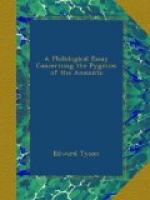6. The little people may have their habitation in forests or trees. Such were the Skovtrolde, or Wood-Trolls of Thorlacius,[A] who made their home on the earth in great thick woods, and the beings in South Germany who resemble the dwarfs, and are called Wild, Wood, Timber and Moss People.[B] “These generally live together in society, but they sometimes appear singly. They are small in stature, yet somewhat larger than the Elf, being the size of children of three years, grey and old-looking, hairy and clad in moss. Their lives are attached, like those of the Hamadryads, to the trees, and if any one causes by friction the inner bark to loosen, a Wood-woman dies.” In Scandinavia there is also a similarity between certain of the Elves and Hamadryads. The Elves “not only frequent trees, but they make an interchange of form with them. In the churchyard of Store Heddinge, in Zeeland, there are the remains of an oak-wood. These, say the common people, are the Elle King’s soldiers; by day they are trees, by night valiant soldiers. In the wood of Rugaard, in the same island, is a tree which by night becomes a whole Elle-people, and goes about all alive. It has no leaves upon it, yet it would be very unsafe to go to break or fell it, for the underground people frequently hold their meetings under its branches. There is, in another place, an elder-tree growing in a farmyard, which frequently takes a walk in the twilight about the yard, and peeps in through the window at the children when they are alone. The linden or lime-tree is the favourite haunt of the Elves and cognate beings, and it is not safe to be near it after sunset."[C] In England, the fairies also in some cases frequent the woods, as is their custom in the Isle of Man, and in Wales, where there was formerly, in the park of Sir Robert Vaughan, a celebrated old oak-tree, named Crwben-yr-Ellyl, or the Elf’s Hollow Tree. In Formosa[D] there is also a tale of little people inhabiting a wood. “A young Botan became too ardent in his devotion to a young lady of the tribe, and was slain by her relatives, while, as a warning as to the necessity for love’s fervour being kept within bounds, his seven brothers were banished by the chief. The exiles went forth into the depths of the forest, and in their wanderings after a new land they crossed a small clearing, in which a little girl, about a span in height, was seated peeling potatoes. ‘Little sister,’ they queried, ’how come you here? where is your home?’ ‘I am not of homes nor parents,’ she replied. Leaving her, they went still farther into the forest, and had not gone far when they saw a little man cutting canes, and farther on to the right a curious-looking house, in front of which sat two diminutive women combing their hair. Things looked so queer that the travellers hesitated about approaching nearer, but, eager to find a way out of the forest, they determined in their extremity to question the strange people. The two women, when interrogated, turned sharply round,




